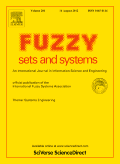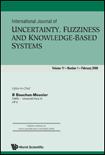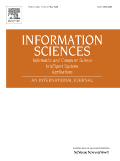
FUZZY SETS AND SYSTEMS
Scope & Guideline
Exploring the Boundaries of Fuzzy Logic
Introduction
Aims and Scopes
- Fuzzy Set Theory and Applications:
The journal covers theoretical advancements in fuzzy set theory, including fuzzy relations, fuzzy measures, and fuzzy logic systems, as well as their applications in real-world scenarios. - Fuzzy Control Systems:
Research related to the design, analysis, and implementation of fuzzy control systems, including Takagi-Sugeno models, adaptive control, and event-triggered control mechanisms. - Fuzzy Decision Making:
Studies focusing on fuzzy decision-making processes that involve uncertainty and imprecision, such as multi-criteria decision analysis and optimization problems under fuzzy conditions. - Fuzzy Neural Networks and Machine Learning:
Exploration of fuzzy neural networks and their applications in machine learning, including classification, clustering, and regression tasks. - Mathematical Foundations of Fuzzy Logic:
The journal also emphasizes the mathematical aspects of fuzzy logic, including the development of new operators, aggregation functions, and algebraic structures related to fuzzy sets.
Trending and Emerging
- Integration of Fuzzy Logic with Machine Learning:
There has been a significant increase in research that combines fuzzy logic with machine learning techniques, particularly in areas such as deep learning, where fuzzy systems are used to enhance interpretability and robustness. - Fuzzy Systems in Networked Environments:
Emerging themes include the application of fuzzy systems in networked environments, particularly for control systems in IoT, cybersecurity, and smart grid technologies. - Advanced Fuzzy Control Techniques:
Research into advanced control techniques, such as event-triggered and adaptive control strategies for uncertain systems, is gaining momentum as researchers seek to optimize performance in dynamic environments. - Fuzzy Decision-Making under Uncertainty:
The journal is increasingly publishing studies focused on fuzzy decision-making frameworks that incorporate uncertainty measures, enhancing decision support systems in complex scenarios. - Fuzzy Systems in Healthcare and Social Sciences:
There is a growing trend towards applying fuzzy systems in healthcare, particularly for diagnostic tools and personalized medicine, as well as in social sciences for modeling human behavior and decision-making.
Declining or Waning
- Classical Fuzzy Logic Applications:
There has been a noticeable decrease in papers focusing on traditional applications of fuzzy logic, such as rule-based systems, as researchers explore more complex and hybrid approaches. - Basic Fuzzy Set Operations:
Research on foundational operations of fuzzy sets, such as basic intersection and union operations, has seen a decline as more advanced methodologies gain traction. - Static Fuzzy Models:
The focus on static fuzzy models is waning, with a shift towards dynamic and adaptive models that can better handle time-varying data and uncertainties.
Similar Journals

Axioms
Empowering Research Through Mathematical Insight.Axioms is a distinguished open-access journal published by MDPI since 2012, dedicated to the field of mathematics. Based in Switzerland, it serves as a platform for the dissemination of high-quality research across various domains including Algebra, Number Theory, Analysis, Geometry, Topology, Logic, and Mathematical Physics. With an impressive Q3 ranking across multiple categories in the 2022 classification, Axioms maintains a robust presence in the academic community, reflected in its Scopus rankings which position it favorably within the top percentiles of its respective fields. The journal aims to facilitate open and rapid access to groundbreaking theoretical advancements and practical applications, making it an invaluable resource for researchers, professionals, and students alike. Researchers are encouraged to contribute their findings to foster innovative discussions and collaborations in the mathematical sciences.

KYBERNETIKA
Fostering Academic Excellence in Cutting-Edge Disciplines.KYBERNETIKA is a distinguished journal published by KYBERNETIKA in the Czech Republic, dedicated to advancing the fields of Artificial Intelligence, Control and Systems Engineering, Electrical and Electronic Engineering, Information Systems, Software, and Theoretical Computer Science. Since its inception in 1972, it has played a pivotal role in disseminating research findings and innovative theories, providing a platform for academic discourse and groundbreaking studies. The journal has evolved through various periods, including converged years from 1972 to 1989 and 1996 to 2024, showcasing a commitment to ongoing scholarship within the vibrant academic community. Its current standing in multiple categories reflects its importance, being ranked in the third and fourth quartiles in various disciplines, thus appealing to diverse researchers and professionals. While KYBERNETIKA does not offer Open Access, it remains a valuable resource for those interested in the latest developments in its respective fields. The address for submissions and inquiries is POD VODARENSKOU VEZI 4, PRAGUE 8 182 08, CZECH REPUBLIC. Engage with this invaluable repository of knowledge to stay at the forefront of research and innovation.

Granular Computing
Pioneering Research at the Intersection of Computing and IntelligenceGranular Computing, published by SpringerNature, is a premier academic journal dedicated to the interdisciplinary field of granular computing, a vital area of research that intersects with Artificial Intelligence, Computer Science Applications, and Information Systems. With an impressive impact factor indicating its prominence, Granular Computing holds a distinguished Q1 ranking in all three categories as of 2023, making it a critical resource for researchers and practitioners seeking to advance their understanding and applications in these rapidly evolving domains. The journal, based in Switzerland, offers a platform for innovative research, thorough reviews, and discussions that push the boundaries of conventional computing paradigms. Aimed at fostering collaboration and knowledge exchange among academics and industry professionals, it continuously publishes cutting-edge findings and theoretical advancements from 2016 through 2024. Although it operates under a hybrid access model, the significance of its contributions is illuminative for anyone aiming to keep abreast of developments in granular computing and its applications.

Mathematical Foundations of Computing
Exploring Theoretical Insights for Modern ComputingMathematical Foundations of Computing, published by the American Institute of Mathematical Sciences (AIMS), is a distinguished open-access journal that has been actively disseminating influential research in the fields of Artificial Intelligence, Computational Mathematics, Computational Theory and Mathematics, and Theoretical Computer Science since its inception in 2009. With its E-ISSN 2577-8838, this journal is committed to providing researchers and practitioners with cutting-edge mathematical theories and methodologies that underpin modern computational practices, which is critical for advancing the field. The journal proudly holds a Q3 categorization in several relevant domains as of 2023, reflecting its contribution and accessibility amid an evolving academic landscape. By offering open access to its content, it ensures that vital research is freely available to a global audience, enhancing collaboration and innovation. Positioned in the heart of the United States, Mathematical Foundations of Computing serves as a crucial resource for advancing knowledge and fostering discussions among researchers, professionals, and students passionate about the mathematical underpinnings of computing.

INTERNATIONAL JOURNAL OF UNCERTAINTY FUZZINESS AND KNOWLEDGE-BASED SYSTEMS
Advancing methodologies for a clearer understanding of uncertainty.Welcome to the INTERNATIONAL JOURNAL OF UNCERTAINTY FUZZINESS AND KNOWLEDGE-BASED SYSTEMS, a prestigious publication dedicated to advancing the fields of artificial intelligence, control systems engineering, information systems, and software research. Published by WORLD SCIENTIFIC PUBL CO PTE LTD in Singapore, this journal serves as a vital forum for the dissemination of innovative theories, methodologies, and applications rooted in the coexistence of uncertainty and fuzziness within knowledge-based systems. With its ISSN 0218-4885 and E-ISSN 1793-6411, the journal consistently ranks in the Q3 category across various Scopus categories, including Control and Systems Engineering and Information Systems, reflecting its influential position in the academic community. Researchers and practitioners alike will find valuable insights and the latest trends through its comprehensive articles, making this journal an essential resource for those seeking to navigate the complexities of this evolving field.

Fuzzy Optimization and Decision Making
Elevating Decision-Making Strategies with Fuzzy InsightsFuzzy Optimization and Decision Making, published by Springer, is a prestigious academic journal that has made significant contributions to the fields of Artificial Intelligence, Logic, and Software. With an impressive impact factor and a consistent ranking in the top Q1 quartile across its categories, this journal stands at the forefront of research dissemination in its domain. Established in 2002 and continuing through 2024, the journal focuses on the theoretical and practical aspects of fuzzy optimization methods and their applications in decision-making scenarios. The journal is highly regarded for its rigorous peer-review process and aims to present innovative research findings that inspire advancements in optimization techniques using fuzzy logic. Aimed at researchers, professionals, and students alike, Fuzzy Optimization and Decision Making serves as an essential resource for those looking to stay at the cutting edge of technology and methodology in mathematics and computer science.

INFORMATION SCIENCES
Fostering Excellence in Information SciencesINFORMATION SCIENCES, published by Elsevier Science Inc, is a premier peer-reviewed journal that has become instrumental in advancing the field of information science since its inception in 1968. With an impressive array of quartile rankings in 2023, including Q1 in Artificial Intelligence, Computer Science Applications, Control and Systems Engineering, Information Systems and Management, Software, and Theoretical Computer Science, this journal serves as a vital resource for researchers and professionals looking to explore cutting-edge theories and practical applications within these domains. The journal is indexed extensively, with notable Scopus rankings, reflecting its significance and influence in the academic community—ranked 6th in Theoretical Computer Science and 10th in Information Systems and Management, among others. Although it does not currently offer an open-access option, the depth of research published within INFORMATION SCIENCES ensures that it remains a key reference point for advancing academic inquiry and addressing complex challenges in the information landscape.

Archives of Control Sciences
Empowering Research in Control SciencesArchives of Control Sciences is a distinguished open access journal dedicated to the field of control sciences, published by the Polish Academy of Sciences. With its ISSN 2300-2611, the journal has been available to the global research community since 2010, ensuring unrestricted access to groundbreaking findings. The journal seeks to present high-quality research covering various aspects of control theory and its applications, appealing to both researchers and practitioners eager to stay at the forefront of innovation. Although specific metrics like the HIndex and category quartiles are currently not listed, the dedication to open access and the backing of a reputable publisher enhances its visibility and accessibility. Located at PL DEFILAD 1, WARSZAWA 00-901, POLAND, the journal invites submissions that contribute to the advancement of knowledge in control sciences, fostering collaboration and the sharing of insights among professionals in the field.

International Journal of Intelligent Computing and Cybernetics
Elevating Academic Discourse in Intelligent TechnologiesThe International Journal of Intelligent Computing and Cybernetics, published by EMERALD GROUP PUBLISHING LTD, serves as a pivotal platform for advancing the field of intelligent computing and cybernetics since its inception in 2008. With a strong focus on innovative research and interdisciplinary collaboration, this journal is positioned in the prestigious Q2 category of Computer Science, ranking at an impressive 42nd out of 232 in Scopus, reflecting an 82nd percentile performance. The journal provides a venue for scholars and practitioners to disseminate their findings on cutting-edge technologies and methodologies that bridge the realms of computing, artificial intelligence, and cybersecurity. Although currently not an open-access journal, it widely circulates valuable insights essential for driving forward academic discourse and practical applications in the rapidly evolving digital landscape. Researchers, professionals, and students are encouraged to engage with this journal to stay at the forefront of advancements in intelligent systems and cybernetic solutions.

INTERNATIONAL JOURNAL OF APPROXIMATE REASONING
Empowering Academics with Cutting-Edge KnowledgeThe INTERNATIONAL JOURNAL OF APPROXIMATE REASONING, published by Elsevier Science Inc, stands as a pivotal resource in the domains of applied mathematics and artificial intelligence. Since its inception in 1987, the journal has evolved into a leader in its field, boasting an impressive impact factor and ranking within the top quartile for applied mathematics (Q1) and high standings in artificial intelligence and software categories according to the 2023 Scopus rankings. As researchers, professionals, and students delve into complex issues surrounding reasoning under uncertainty, this journal provides invaluable insights and cutting-edge research. In addition to its rich content, the journal's commitment to advancing knowledge in theoretical computer science further enhances its significance in fostering academic growth. While the journal does not currently offer open access, its rigorous peer-review process ensures that only high-quality, impactful studies are published, solidifying its role as an essential source for academics striving to remain at the forefront of their fields.